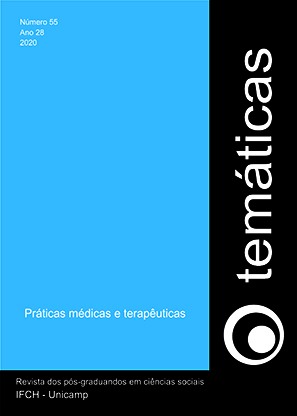Abstract
Understanding the human experience beyond the agency - structure dichotomy is a challenge faced by different theories and anthropological schools. In this perspective, we present three different theories that sought to overcome the structuralist explanation of the world: the studies of social networks, proposed by British anthropology in the second half of the twentieth century, as a way of overcoming structural-functionalism; the actor-network theory proposed by the French Bruno Latour, as a way of overcoming the "sociology of the social"; and the notion of meshwork, elaborated by Tim Ingold in the construction of an "anthropology of life". All three perspectives, somehow, have the concept of "network" present. However, such a presence has radically different meanings in each of them.
References
BARNES, John. Class and Committees in a Norwegian Island Parish. In: BARNES, John. Models and interpretations. Cambrige: Cambrige University Press, 1990, p. 39-58.
BARNES, John. Redes sociais e processo político. In: FELDMAN-BIANCO, Bela (Org.). Antropologia das Sociedades Contemporâneas. Métodos. São Paulo; Editora UNESP, 2010, p. 237-364.
BATESON, Gregory. Steps To An Ecology Of Mind. Chicago: University of Chicago Press, 2000.
BOTH, Elizabeth. Família e rede social. Rio de Janeiro: Francisco Alves, 1976.
DELEUZE, Gilles. & GUATTARI, Félix. O que é um conceito? In: Deleuze, Gilles. & Guattari, Félix. O que é Filosofia? Rio de Janeiro: Editora 34, 1992, p. 25-47.
DUTRA, Rogéria Campos de Almeida. Família e Redes Sociais: um estudo sobre práticas e estilos alimentares no meio urbano. (Tese de doutorado). PPGAS, Museu Nacional, Universidade Federal do Rio de Janeiro, 2007.
FELDMAN-BIANCO, Bela (Org.). Antropologia das Sociedades Contemporâneas. Métodos. São Paulo; Editora UNESP, 2010.
GLUCKMAN, Max. Análise de uma Situação Social na Zululândia Moderna. In. FELDMAN-BIANCO, Bela (Org.). Antropologia das Sociedades Contemporâneas. Métodos. São Paulo; Editora UNESP, 2010, p. 237-364.
INGOLD, Tim. Culture, nature, environment: steps to an ecology of life. In: Ingold, T. The perception of the Enviroment. Essays on livelihood, dwelling and skill. London: Routledge, 2000, p. 13-26.
INGOLD, Tim. Rethinking the animate, re-animating thought. Ethnos. 7(1): 9-20, 2006.
INGOLD, Tim. Trazendo as coisas de volta à vida: emaranhados criativos num mundo de materiais. Horizontes antropológicos. 18 (37): 25-44, 2012.
INGOLD, Tim. Repensando o animado, reanimando o pensamento. In: INGOLD, Tim. Estar Vivo: Ensaios sobre movimento, conhecimento e descrição. Petrópolis: Editora Vozes, 2015, p. 115-126.
INGOLD, Tim. Quando a formiga se encontra com a aranha: teoria social para artrópodes. In: INGOLD, Tim. Estar Vivo: Ensaios sobre movimento, conhecimento e descrição. Petrópolis: Editora Vozes, 2015, p. 144-152.
INGOLD, Tim. Contra o espaço: lugar, movimento, conhecimento. In: INGOLD, Tim. Estar Vivo: Ensaios sobre movimento, conhecimento e descrição. Petrópolis: Editora Vozes, 2015, p. 215-229.
KUHN, Thomas. “As revoluções como mudanças de concepção de mundo”. In: KUHN, Thomas. A estrutura das revoluções científicas. São Paulo: Perspectiva, 1978, p. 145-171.
KUHN, Thomas. O caminho desde A Estrutura. São Paulo: Editora UNESP, 2006.
LATOUR, Bruno. Ethnography of a ‘high-tech’ case: about Aramis. In: LEMONNIER, Pierre (Org.) Technological Choices: Transformation in Material Cultures Since the Neolithic. London: Routledge, 1993, p. 372-398.
LATOUR, Bruno. Gabriel Tarde and the end of the Social. In: JOYCE, Patrick (Org.). The Social in question. New Bearings in History and the Social Sciences. London: Routledge, 2002, p. 117-132.
LATOUR, Bruno. Reagregando o social: uma introdução à teoria do ator-rede. Salvador: EDUFBA-EDUSC, 2012.
LAW, John. Actor network theory and material semiotics. In: TURNER, Bryan S. (Org.). The new Blackwell companion to social theory. West Sussex: Wiley, 2008, p. 141-158.
LAW, John. Material Semiotics. 2019. Disponível em: https://www.heterogeneities.net/publications/Law2019MaterialSemiotics.pdf. Acesso em: 02 jun. 2020.
MITCHELL, J. Clyde. The concepts and use of social networks. In: MITCHELL J. Clyde (ed). Social Networks in Urban Situations: Analysis of Personal Relationships in Central African Towns. Manchester: Manchester University Press, 1969, p. 1- 50.
VARGAS, Eduardo; LATOUR, Bruno; KARSENTI, Bruno; AÏT-TOUATI, Frédérique; SALMON, Louise. O debate entre Tarde e Durkheim. Teoria e Sociedade, 2015, número especial: 28-61.

This work is licensed under a Creative Commons Attribution-NonCommercial-ShareAlike 4.0 International License.
Copyright (c) 2020 Leonardo Francisco de Azevedo

